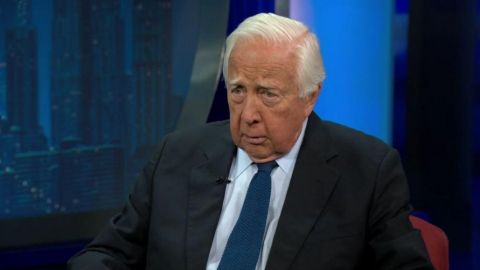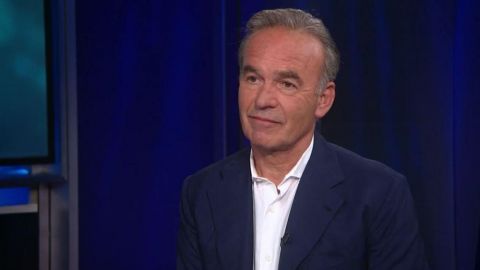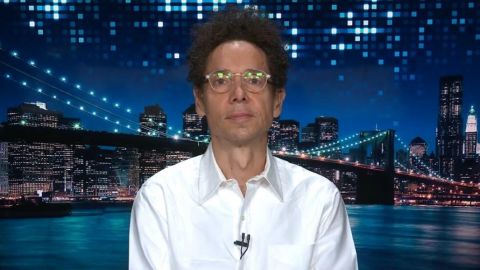Read Transcript EXPAND
CHRISTIANE AMANPOUR: We turn now from that groundbreaking musician to the early pioneers of America’s Midwest. It’s a focus of the new book by the Pulitzer-Prize winning historian David McCullough. And it’s called “The Pioneers, The Heroic Story of the Settlers Who Brought The American Ideal West.” It documents the figures who overcame incredible hardships to build a community that was based on freedom of religion, free universal education, and the prohibition of slavery. Walter Isaacson began by reading McCullough the opening sentence from his latest work about the crucial role of a Massachusetts’ Reverend.
(BEGIN VIDEO TAPE)
WALTER ISAACSON, CONTRIBUTOR: I’m going to read the opening sentence of this book, “The Pioneers” because it’s amazing to me. It’s never before as he knew had any of his countrymen set off to accomplish anything like what he had agreed to undertake. A mission that should he succeed would change the course of history. I think it’s impossible not to keep reading. What was that mission?
DAVID MCCULLOUGH, HISTORIAN AND AUTHOR, THE PIONEERS: To create what was called a northwest territory, which is that territory seeded to us by the British after the end of the revolution, which would eventually include five states Ohio, Indiana, Illinois, Michigan, and Wisconsin, an area that was all still wilderness and would double the size of our country. The Ohio company which was called — tavern in Boston by veterans of the revolution. It was to create a new America in effect out there, which would be based on four fundamental precepts, four fundamental objectives. One, it would be complete freedom of religion. Two, that the native peoples living there would be treated with respect and faith in them. Three, that there would be public education for everybody starting at grade school all the way through college. No state had anything remotely close to that. Of course, it turned out to be the birthplace of all of our state universities. And fourth, and most important of all, most radical of all, there would be no slavery. This man who ‘s starting off was determined that the idea of all men are created equal, would not just be words on paper but would be in fact part of American life, that there would be no slavery in that huge new empire, as it were.
ISAACSON: This is Manasseh Cutler.
MCCULLOUGH: Manasseh Cutler who was a classic like your Ben Franklin, 18th century, who was a doctor of law, a doctor of divinity, and a doctor of medicine. All three at once. And probably because he was a minister and probably because he was, therefore, completely trustworthy and rightly so, he succeeded. He got it through, through Congress. And as a consequence, slavery would not be permitted in this new empire. Up until a point when after years later when Jefferson became president, there was a big movement to end that rule and to admit slaves.
ISAACSON: Getting to the slavery thing, Jefferson is an interesting figure here because he’s in favor at first in the northwest ordinance of keeping slavery out. And he wrote that sentence. You know, we hold these truths to be self-evident but he backslides.
MCCULLOUGH: Yes, he did. He said it wouldn’t be good for his political standing back home if he voted for it. Also, he was leaving to become our representative, our ambassador to France. So he had that much on his mind. He was going out and leaving the stage, as it were.
ISAACSON: How do we judge from today these people of the past like a Jefferson who is a larger than life character in the formation of our values and yet has this thing where it just is so, you know, bad in our current light that he keeps arguing for slavery.
MCCULLOUGH: History is human. You know that as well as I do. It’s about people. And many of the great figures of history civilization have been often quite imperfect. And but that doesn’t mean what they accomplished wasn’t important or valuable or admirable. Jefferson was a brilliant architect. If he had been nothing but an architect, he would be someone we should know about. But my feeling strongly now, I think it’s one of the motivations that drove me in writing this book is that we have heroes all through our history who have never been given the light that they deserve. Never been brought on stage or brought to center stage. These are all people — people — figure in my new book are people you’ve never heard of.
ISAACSON: This is in Marietta, Ohio?
MCCULLOUGH: In Marietta, Ohio. Marietta, Ohio was the first legal settlement in all the northwest territory. The white men and women in that territory were either hunters or trappers or squatters. They’re there legally. And they’re there because they’re being compensated as veterans for how they’ve been paid for their service to the country, which was in what was called scrip and it was virtually worthless. Ten cents on the dollar. So they’re saying here is this land which you can have by very inexpensive price, where the topsoil is 5 feet deep, where there’s every kind of tree from which you can make boats or anything else you want to build or make. And they were going build boats because it was on the Ohio River. They were going to take it down Ohio to the Mississippi, down the Mississippi to New Orleans, and out to sea. And nobody had had the imagination to realize this was going to be possible. The river isn’t the heart of the story. When they decided to create this new settlement and the juncture of the Ohio which is about 90 miles downstream on Ohio, Pittsburgh where Ohio begins. A beautiful location and still is absolutely stunning. One of the most beautiful locations in our whole country. They named it for Marie Antoinette, Marietta because they felt that she, as much as Ben Franklin, maybe more, they felt, had brought France in to help us win the war. And of course, we wouldn’t have won the war without the help of the French. Not just with money but with military force. And so as a tribute to France and then they set about to create this ideal community and they did.
ISAACSON: Manasseh Cutler who help get the ordinance —
MCCULLOUGH: Right.
ISAACSON: — his son who helps found Marietta, these are sort of the unsung heroes —
MCCULLOUGH: Right. Rufus Putnam —
ISAACSON: — that you’re writing about. Were they doing it mainly as a commercial enterprise?
MCCULLOUGH: No.
ISAACSON: Or mainly as an errand into the wilderness?
MCCULLOUGH: Absolutely not. No, they were not doing this to get rich or to get famous or have a lot of possessions. They were doing it to create what they hoped would be an ideal community and to be sure essentially a New England community and essentially a New England community which was based on the traditions.
ISAACSON: One of the core values of the northwest ordinance and of this group, besides eliminating slavery, was to live in peace and harmony with the native Americans.
MCCULLOUGH: Yes.
ISAACSON: And the Indians there.
MCCULLOUGH: Yes.
ISAACSON: They fail at that
MCCULLOUGH: Well, they themselves didn’t fail at that but the white settlers that came after them and to some extent some of their own people, to be sure, failed. But Rufus Putnam who was the leader, he was really the man that made it happen. He stuck to the principle as best he possibly could. When this warfare began in 1891, there was never any attack on Marietta because the respect the native tribes had for Rufus Putnam and his integrity.
ISAACSON: Well, to some extent in the book, you call these people the settlers. But of course, it wasn’t a real wilderness that hadn’t been settled. It was a flourishing civilization back 2,000 years really, right, which you talk about the mounds of the Native Americans.
MCCULLOUGH: Yes. And dated back to maybe the thousand B.C. And one of the things that Rufus Putnam did was to make sure that that property, 90 acres would not be molested and changed. So he made that where the mound is about 30 feet high. He made a graveyard for people living there then and would die there and be buried there, including Rufus Putnam. In that way, it would be saved and is still there. It’s a treasure.
ISAACSON: You have some of the settlers here. You quote them as calling the Indians savages.
MCCULLOUGH: Yes.
ISAACSON: And even you mentioned that a couple of times. And yet there’s a guy, Hara Sny (ph) who is one of the settlers who says maybe we’re the savages.
MCCULLOUGH: Oh, absolutely.
ISAACSON: Could you have done more or try to find more to see it in the other direction of what the native Americans may have thought about people taking their land?
MCCULLOUGH: Well, I think — I would like to think I’ve included everything that related to my story, to my characters. I wanted to see things through their eyes. And they didn’t call them Native Americans, for example. They called them Indians or they talked of the tribes. I think one of the things that most people don’t understand is how many different tribes there were and how they were the same. They weren’t all the same. And I think one of the most telling examples of all this empathy for the Native Americans among several of them, five characters who were the principal subject of my book is that when Samuel Hildreth went to speak before a medical convention in Cleveland about 1831, I think it was, he in his effect delivered what was a hymn to the vanished wilderness by then, vanished and to the original occupants that once occupied that wilderness.
ISAACSON: And do you understand the criticism now that some of the Native Americans have felt about that? Or do you think that’s sort of —
MCCULLOUGH: I don’t know that they felt (INAUDIBLE) but I hope that he would know that I’m all for what they’re doing. I’m all for anything they can do. One of the things we don’t have is the letters and diaries and memoirs written by the Native Americans. We don’t even have a picture. We don’t even know what blue jacket, one of the key figures in this drama, we don’t even know what he looked like. And one of the thrills of this collection is that all portrait of each of the five characters and all were living and playing out their roles in life before photography had been invented. Otherwise, I would have to try to sub pose from descriptions written about them what they look like.
ISAACSON: You started your career as a journalist. To what extent do you bring your journalistic skills to writing a book?
MCCULLOUGH: I never imagined I would be writing history. I don’t know about you. I never imagined I would be writing a biography. But I was working for the USIA during the Kennedy years and I went up to the Library of Congress to look for some material, the editor of Life Magazine, Style Magazine. These are a lot of pictures. It came in one day and the table that spread out photographs taken by a photographer who got over the mountains within a few days after that terrible flood there. And I couldn’t believe what I saw. And when I saw in the photographs, I thought whoa how in the hell did that ever happen? And I got going on reading about it and I realized I love doing this. This is what I’m going to do from now on.
ISAACSON: You talk about the values of decency, caring about community and neighbors that were part of the founding. You do that in all your books and then here with the westward expansion of America. So you look at our leadership today. And you keep talking about humility.
MCCULLOUGH: Yes, right.
ISAACSON: Not bragging, having basic values. Do you think we’ve really lost that in Washington? And what should people do?
MCCULLOUGH: They should straighten up and look back at the values that they were brought up with, that were taught in school, the lessons and history. Many of our finest presidents have been historians as well as political leaders. I think history should be required if, for no other reason, that young people should realize, if they don’t already, that some things in life are required. And one of them is to be honest and truthful and decent to your fellow citizens and helpful to the needy. Treating everybody alike. Recognizing that it’s from immigrants that so much of what we’ve achieved in this country has happened because of a genius of people who have come into this country from elsewhere.
ISAACSON: Throughout your career, you’ve had a really important partner, your wife. And I’ve watched her influence on you. Tell me a story about Rosalee.
MCCULLOUGH: She was reading my book about Theodore Roosevelt when he was on horseback. We were making changes and so forth. And we got to a point near the end of the book and she was reading aloud and she stopped and said there’s something wrong with that sentence. And I said, well, read it again. She read it again. And she said something is wrong. I said I know there is. Give me that. So I read it aloud to her and she said — I said forget it. We’ll move on. So we moved on. Finished the book. Sent it to the publisher. The book was published and it got a very favorable review in the New York Review of Books. And he said, sometimes, however, Mr. McCullough doesn’t write very well. Consider this sentence.
ISAACSON: Well, it’s probably worth it to have that because you got a good story out of it.
MCCULLOUGH: Yes. Thank you.
ISAACSON: David, thank you for being with us.
MCCULLOUGH: Walter, thank you for including me.
About This Episode EXPAND
Christiane Amanpour speaks with Malcolm Gladwell about his hit podcast, “Revisionist History.” Award-winning director Nick Broomfield joins the program to reveal the story behind one of Leonard Cohen’s most iconic songs, “So Long Marianne.” Walter Isaacson sits down with Pulitzer Prize-winning historian David McCullough to discuss his new book.
LEARN MORE


